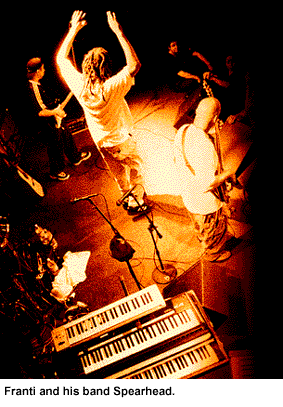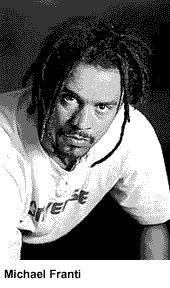|
Taken from Green Left Weekly (July 20, 2001)
Franti makes revolution `irresistible'
by JODY BETZIEN
 MELBOURNE - Having arrived at his St Kilda press conference more than an hour late, Michael Franti was quick to break with the convention and respectability of the expensive surrounds of the Astor Hotel. MELBOURNE - Having arrived at his St Kilda press conference more than an hour late, Michael Franti was quick to break with the convention and respectability of the expensive surrounds of the Astor Hotel.
Sitting on the back of the expensive couch barefoot instead of sipping the bottle of spring water carefully left for him, he began to answer questions from the assorted young journalists.
First asked whether he was writing his music with a particular demographic in mind Franti quickly put to rest the cynicism underlying the question that implied his political material was simply a marketing tool. In reply he joked that he wrote for "black/Asian under-25 lesbians" and then quipped "No".
Franti, formerly of industrial rap outfit Disposable Heroes of Hyphoprisy, is in Australia promoting his third release with his band Spearhead. The epic 73-minute album Stay Human includes 13 songs woven around a fictitious community radio talkback show discussing the impending execution of falsely convicted black activist, "Sister Fatima".
 Between musical messages ranging from Jackson 5-like soul-pop to funky rock to house-disco to hip-hop reggae, we hear updates of Fatima's story. Fatima is denied a stay of execution by the governor (played in darkly comedic fashion by Woody Harrelson) on the eve of his come-from-behind Between musical messages ranging from Jackson 5-like soul-pop to funky rock to house-disco to hip-hop reggae, we hear updates of Fatima's story. Fatima is denied a stay of execution by the governor (played in darkly comedic fashion by Woody Harrelson) on the eve of his come-from-behind
re-election. The next morning, the real murderer comes forward and confesses.
Franti's work is always overtly political - in an earlier interview, he stated his goal as "to make the revolution irresistible" - so the theme of Stay Human is carefully chosen.
In developing the concept for it Franti wanted to focus on the theme of race and the death penalty but avoid writing a "rock opera"-style album.
Originally written as a play, the talkback radio show features former Black Panther Kiilu Nyasha as Sister Fatima. Nyasha's partner George Jackson, also a Black Panther, is widely believed to have been murdered by the FBI.
Franti chose actors to play the parts that he thought would identify with the issue, including actor Woody Harrelson whose father is on death row for the alleged murder of a cop in the US.
Given the obvious importance to him of the death penalty, Franti was asked what his thoughts were on the recent execution of Oklahoma bomber Timothy McVeigh.
"The McVeigh execution really disturbed me. It was about an American military man ... a soldier trained to kill", he said. "Had he dropped that bomb in Kosova or Iraq he would have been labelled a national hero. But in America we kill him."
On the campaign to free black activist Mumia Abu Jamal from death row Franti commented, "I'm always thinking about Mumia, I've really become fervent in my views about the death penalty as a whole. I didn't just want to write about one case and convince the world about innocence or guilt. But even when I was a kid, I used to say the death penalty is wrong. What if they get the wrong guy and it happens to be me?
"Being African-American in America, that happens to be part of our experience. As I got older I came to the simple conclusion that killing is wrong, even in retaliation for killing. It's the politics behind who you killed that gets people on death row."
"As Angela Davis explained to me, the determining factor is not really race but economics. If you can afford the lawyers you can save your skin. And so, in a sense, all people on death row are political prisoners."
Franti sees community radio as particularly important in providing alternate views to that of the corporate media. While he identifies the internet as a useful tool he believes it "doesn't have the immediacy that radio does".
Putting this belief into action, Spearhead often takes a low-level radio transmitter on tour, leaflets the neighbourhood around the gig and then broadcasts its show.
Asked about his thoughts on whether globally we are witnessing a renewal of social justice activism, Franti was optimistic.
"Globally people are starting to realise `I paid $150 dollars for these shoes, the person who made them got 17 cents, where did all the money go?'."
Music was "in part fuelling movements", he said, but added that we're in "a low period of musical consciousness ... All these boy bands, Britney Spears, Jessica Simpson, haven't left much space for artists who are screaming about things."
Asked whether in this climate he felt like a lone crusader Franti answered a decisive "No".
"I'm in touch with the activist community. Many people do what I do. I just do it different."
Locally Franti has made it his business to link up with indigenous activists. Building on a relationship with the Winja Ulupna Aboriginal women's drug and alcohol rehabilitation centre established during previous visits to Australia, Franti played a spoken word benefit in Melbourne on July 14 to raise funds.
Despite Franti's willingness to continue the press conference that had turned into an examination of his politics on a range of issues, and avoided almost totally discussion about music, his publicists were quick to wrap it up.
With record company minders in tow, ready to push him in the direction of the photographer with the biggest lens, his 1998 comment that "It's tough to make a living when you're an artist, it's even tougher when you're socially conscious. Careerism, opportunism can turn the politics into cartoonism" came to life.
In the face of such pressure Michael Franti is one of a handful of artists who have prospered in the cracks of the corporate-created music market and remained faithful to his political beliefs.
|